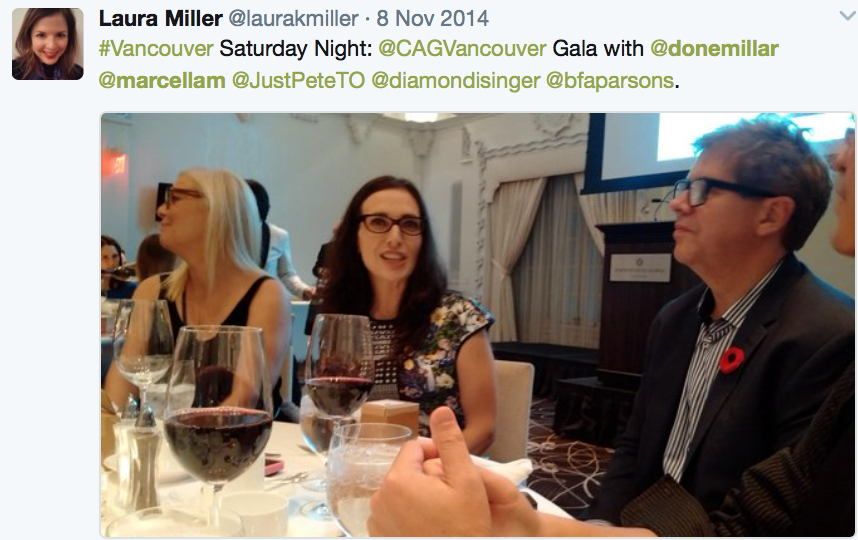
Bob Mackin
Ladies and gentlemen, Pamela Martin and Steve Darling.
Just two folks who used to make their living in the news business. They were best-known for sitting on chairs in front of TV cameras and lights, smiling while they read the headlines written by someone else, before letting other people tell the stories.

Pamela Martin
They are now trying to make it big in what Frank Zappa called the showbiz wing of industry: politics. Martin as the BC Liberal Party’s liaison to leader Christy Clark. Darling as the rookie candidate in Burnaby-Lougheed. He was recruited as the star candidate after his unceremonious disposal last fall from Global TV after an 18-year run. Darling’s campaign is managed by George Psefteas, a federal Conservative protege of BC Liberal power broker Patrick Kinsella. Psefteas most-recently worked as Surrey Mayor Linda Hepner’s chief of staff.
On April 2, they tried to make reading from talking points sound like a real, live conversation in what was billed as a phone call for BC Liberal volunteers. It was not a phone call with volunteers, because it was a listen-only event. It was not clear whether it was really live or just pre-taped. Listen to the excerpt.
For a party that thrives on selfies, there aren’t any on Martin or Darling’s Twitter accounts about this event. There is a photo from moderator Dylan Kruger’s account showing a microphone in a studio.
The call lasted 24 minutes and 30 seconds and it test-marketed several Liberal messages. One that you’ll see and hear often during this campaign is that “(insert candidate name here) is listening.”
Martin and Darling only listened to themselves. They didn’t give volunteers a chance to be heard on the listen-only call.

Steve Darling
It included riveting exchanges like this:
Pamela: “Do you have any advice for the volunteers who are on the line who are starting out volunteering and maybe they don’t such a nice reception possibly?”
Steve: “You run into people all the time that don’t want to be part of our party or not voting for us or are not fans of whatever it is. Everyone has an opinion. I’ve run into fans of ours and not fans of ours.
“The one most important thing I can say to everyone is something that I learned a very long time ago when I first got into broadcasting. And Pamela you know this as well. The number one thing is be a good listener and say ‘I understand you have concerns, so tell me what those concerns are’ and listen to them and understand why they have those concerns. Trust me, you’re not on the doorstep to solve everybody’s problems, but you’re there to say ‘here’s what we’re about, here’s what we think, tell me what you think.’ If they don’t agree with you that’s fine, but listen to them, take their feedback, write it down, and move on.”
To do their job, TV news readers must listen… to the directors that direct them, via a small earplug. It is not an easy thing to do while reading the teleprompter and looking into the camera. But it is vastly different from listening to citizens, the true bosses of a politician.
Darling claimed that he was “as hard on the government as when you were a journalist as well.”
He gave no examples.
“Nobody’s perfect,” Darling said. “We’re safe to say nobody is perfect and as long as you get up in the morning, you listen to people, work hard and try to do your best, that’s all people can ask.”
Not everyone loves us
The duo did concede that there is not unanimous support for the BC Liberals across the province.
Pamela: “After four terms, there is bound to be some people that aren’t going to like some things that our, the BC Liberal Party government, have done. But it’s still our job to listen to know what the public is thinking and to respond to them the best way that we can.
Steve: “There’s been some good things as well, some positive things. You look at the economy alone and how well it’s doing.”
Darling knows that is not entirely true. The news he read to Global viewers included headlines about foreign cash causing an overheated real estate market and construction industry, displacement of people with lower incomes and increasing homelessness across the province. The perceived prosperity train is not stopping for all British Columbians.
As the campaign progresses toward May 9, you are bound to hear more of the above from Pamela, Steve and the rest of the Team B.C. 2017 Laura Miller Campaign College graduates.

Millar (right), Clark and Robertson’s spin doctor.
You might even hear an apology. Yes, you read that correctly.
In Vancouver’s 2014 civic election, Mayor Gregor Robertson was staring defeat in the face. Two days before the Nov. 15 vote, he issued a surprise, yet vague, apology to Vancouverites on a CBC debate and pledged to do better to listen to their concerns. He also made an appeal to voters supporting the left-wing COPE party to vote Vision Vancouver, rather than splitting the vote. It worked. Robertson won a third term and Vision kept its majority on city council.
Robertson’s key campaign advisor, Don Millar, is also a longtime Clark spin doctor.
So, when the going gets tough, watch for Clark or — more likely — a proxy, to play the sorry card. Something like this: Mistakes were made, but don’t let them overshadow the good work done. We’ll do better to earn your trust in the next four years. We’ll listen. We promise. Vote for us.
Why it’s more likely to be a proxy is obvious. Clark’s recent apologies for falsely accusing the NDP of hacking the BC Liberals website and the wrongful firing of eight health researchers were reluctant, feeble and insincere. She’s known widely as a master campaigner, but nobody has ever accused her of being genuinely contrite.
Claiming to have a plan for a “bright future” while bashing the NDP for its 90s misdeeds can only take the Liberals so far in an era of change. Informed voters know that the contemporary Liberals have a long, dark past past since 2001. The NDP’s platform contains a handy guide to the scandals since 2001. Privately, the Liberals are worried a portion of their base might not vote or hold its nose and vote NDP or Green.
The Liberals have what the NDP didn’t have: the stigma of the suicide of a wrongly fired Ministry of Health researcher, who was bullied to death under a government whose premier wears a pink shirt once a year for an anti-bullying flash mob photo op.
When that Clark proxy apologizes, will voters tell the Liberals, in George Costanza fashion, to stuff their sorries in a sack?











